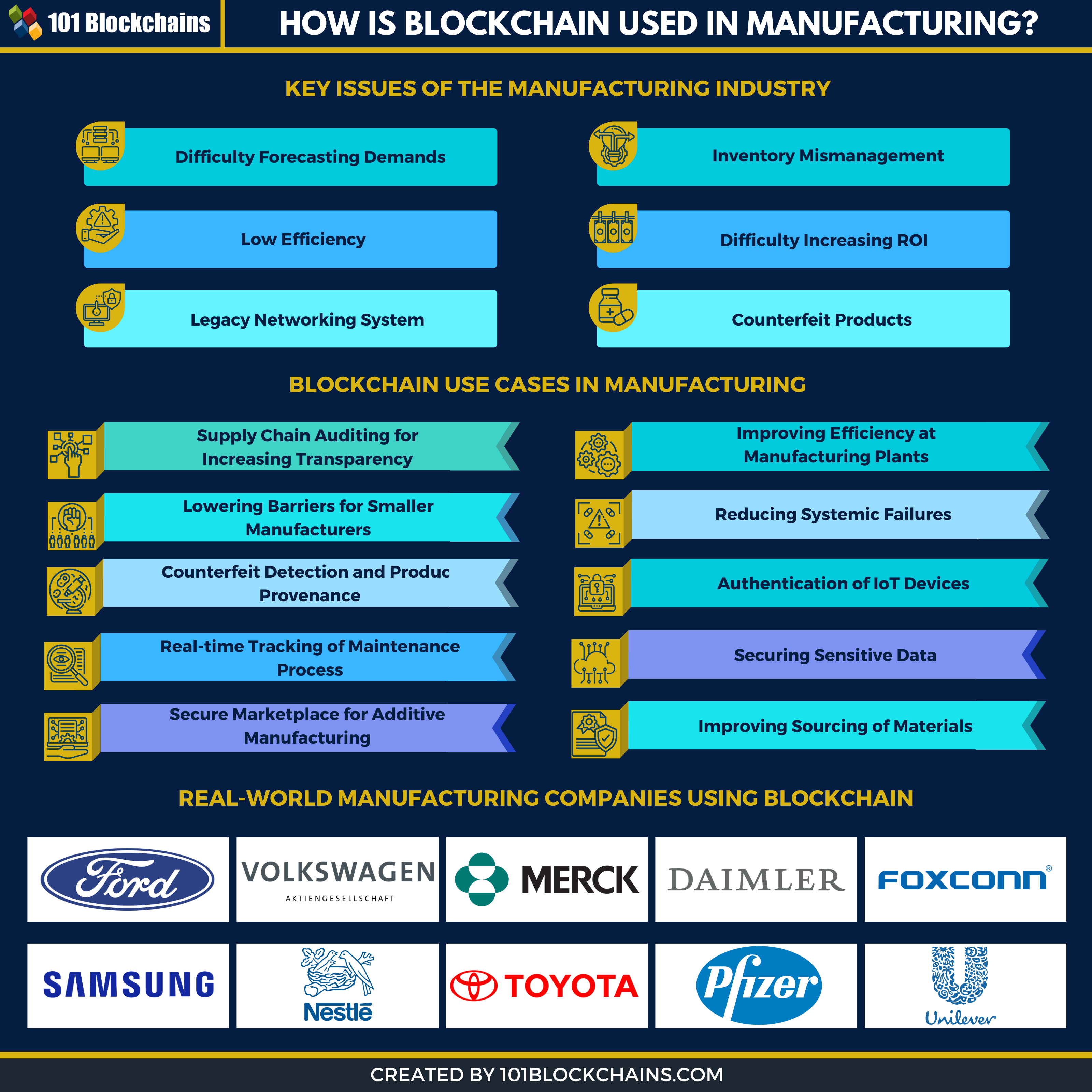Learn how blockchain truly works, master key definitions, and uncover what makes smart contracts so "smart." Dive into the fundamentals, gain valuable insights, and start your blockchain journey today!

- Reviews
Hasib Anwar
- on November 29, 2020
Blockchain In Manufacturing: A Guide To Industrial Empowerment
Blockchain’s potential is perfectly suited for manufacturing. Let’s understand how blockchain can increase the business value in the manufacturing sector.
In reality, the manufacturing sector contributes heaving into the GDP of every country. You can see the impact on the US economy the most. In the Q4 for 2019, manufacturers were responsible for $2233.4 billion! Therefore, it amounted to 11.39% of the total economy. So, you can see how manufacturing is an important element in a country’s growth.
However, this sector is also plagued with lots of issues. Therefore, the impact on the world’s GDP is decreasing day by day. Due to the increased international influences, manufacturers need to stay interconnected with each other. But only the blockchain can make that happen now.
Therefore, manufacturers around the globe are starting to develop blockchain solutions to streamline their operations and increase their visibility. As the blockchain has the potential to alter the entire process of manufacturing, it’s only relevant that companies start to come together and create a blockchain-based ecosystem.
In this article, we will focus on the importance of blockchain in manufacturing. This will help any novices out there to realize the current scenario of the manufacturing industry. More so, it will also help in learning how you can use this technology for your very own manufacturing processes.
Build your identity as a certified blockchain expert with 101 Blockchains’ Blockchain Certifications designed to provide enhanced career prospects.
Blockchain in Manufacturing: Why Does This Sector Need Blockchain?
The manufacturing industry deals with a lot of issues at the moment. In reality, the sector is falling behind greatly due to the increased amount of inconsistencies and mismanagement. Therefore, this sector needs a dire change at the moment.

Difficulty Forecasting Demands
As the market keeps on changing all the time, it’s quite difficult to keep up with the new trends all the time. Therefore, many manufacturers can’t forecast what kind of products are in demand in the future. This lack of ability damages the reputation of the manufacturer as they can’t come up with successful product projections to ensure their role in the changing markets.
Also, they don’t seem to possess any necessary tool that can help them to estimate how many or when they should keep selling a specific product. Thus, they end up with a lot of products due to production surplus. In many cases, they even face a production shortage as well.
Inventory Mismanagement
This is another big issue for the manufacturing company. Practically, the model they follow to manage the inventory is way backdated and full of problems. Although automation did solve some of the problems, the overall complexity of the management is overwhelming for many manufacturers.
Due to the mismanagement, they fail to deliver the products in time, resulting in losses. More so, they also fail to preserve the products in the right environment leading to losing a lot of money.
In reality, tracking inventory is a costly process, so many aren’t keen to use it. But the manual labor, in this case, is time-consuming and error-prone. So, they need a solution that can save costs and help them manage inventories more efficiently.
Low Efficiency
The issue is if you want to increase efficiency, you have to reduce the costs and even the quality of the products. Unfortunately, this is the manufacturing company’s current scenario, where they try to degrade their quality to increase efficiency. Needless to say, this approach results in consumer dissatisfaction resulting in fewer revenues for the companies.
But many manufacturers can’t get out of this loophole, where the efficiency is negatively connected with the costing. In many cases, those who choose quality have to sacrifice their efficiency and fall victim to increased costing.
Difficulty Increasing ROI
Obviously, every manufacturer would want to increase their ROI (Return on Investment) by any means. In reality, this process will significantly increase their sales or even increase the value of their products. But there aren’t many effective ways the companies can do that. Also, during many economic downfalls, the consumers aren’t able to invest their money in products.
Thus, it lowers the companies’ overall sales, and they don’t have any necessary means to outsmart the system. So, many manufacturers face huge difficulty in increasing their ROI.
Skilled Labor Shortage
We know that robotics or automation can help in filing up for human labor. But machines can’t do everything at the moment. In many cases, human capabilities are much needed to get the system going without any issues. However, the lack of skilled labor to manage the outputs efficiently or to solve any issue swiftly is taking a toll on this sector.
Also, the baby boomer generation’s retirement is giving rise to labor shortage as other generations feel this type of job as degrading. Therefore, the manufacturing industries are having a hard time keeping up with the requirements with a small amount of available labor.
Legacy Networking System
New technologies emerge every year, and it’s hard to keep up with the changing times. For example, the IoT devices or the manufacturing software, or even the robotics can become overwhelming for a small-time manufacturer.
However, the use of these technologies in big-time manufacturers ensures a greater output than small timers. Therefore, small-timers are at a big disadvantage and can’t keep up with the competition. Thus, it gives rise to a gap in the manufacturing sector where only the big names profit and small-timers fall behind.
Counterfeit Products
Another big issue is the increasing number of counterfeit products. Criminal manufacturers tend to mix up the counterfeit products with the real ones making it impossible to track them down. But this issue degrades the brand of the mother company, and consumers start to avoid buying the products. As a result, the sales start to decrease the company starts to lose money. On the other hand, illicit parties start getting payouts for bad quality and low-grade products, and this shifts the market entirely.
Therefore, companies need to fight off this issue with efficiency so that the consumers can get the value they are paying for.
Lack of Proper Auditing Model
The lack of a proper auditing model in the manufacturing scene is another massive issue of this industry. In reality, without a proper auditing model in place, many companies can’t track the quality of the product at each stage. So, it becomes hard to find out the current source of the issue when they identify the issue in the finished product.
In reality, this leads to massive losses over the years, and companies have to bear the burden of disposing of millions of dollars of worth products just because they couldn’t ensure the quality.
How Can Blockchain Improve Manufacturing?
Blockchain can improve manufacturing by offering a decentralized infrastructure. We know that the decentralized structure isn’t suited for the enterprise environment. However, the features that come with this structure can actually help the manufacturing companies in various ways. For example, blockchain can offer a no tampering policy, which means once data gets an entry in the system, it stays there. So, no one can change it or tamper with it.
More so, the blockchain can establish the use of a proper auditing system. In reality, everything in blockchain goes through various auditing processes. So, it’s the perfect tool that can help companies to regularly audit the quality of the products in real-time. Using IoT devices, they can easily monitor the condition of each product.
Another great way blockchain can improve manufacturing is the reduction of costs. In reality, blockchain can help companies to reduce costs without harming their quality in any way. So, companies can finally break free of the loopholes and finally offer their best products for the consumers. More so, it can help save a lot of resources for the small-time manufacturers as well.
Lastly, blockchain in manufacturing markets can improve the transaction process that happens within the ecosystem. Everything is done within seconds, paying up the supplier, dealing with the distribution center, or logistics. Previously, it would take days to process the transactions. But using blockchain, you can do it within minutes!
So, this is a massive boost up for all the companies as they can now increase their efficiencies to the fullest. As you can see, the importance of blockchain in manufacturing is vast, and there is no exception to it.
Curious to learn about blockchain implementation and strategy for managing your blockchain projects? Enroll Now in Blockchain Technology – Implementation And Strategy Course!
How Is Blockchain Used in Manufacturing?
Supply Chain Auditing for Increasing Transparency
This is one of the best blockchain in manufacturing use cases at the moment. In reality, 78% of companies worry about the process of supply chain auditing, and the waste due to that keeps on increasing. So, this is an issue that needs an immediate solution. Blockchain can easily help out in this case.
In reality, blockchain can offer real-time auditing of the products and ensure that the data is corruption-free. More so, you can use blockchain to check up on the production line anytime you want. This is a great way to reduce the amount of wastage and increase revenue.
Excited to learn about the supply chain in blockchain? Enroll Now in Enterprise Blockchains and Supply Chain Management Course
Improving Efficiency at Manufacturing Plants
Another good use case is the improvement of efficiency throughout the manufacturing sector. As you already know, the manufacturing plants have to deal with a lot of inefficacy issues. But there isn’t any good way to increase it without destroying the product quality. But using blockchain can help them maintain a good balance between the two elements.
In this case, no one has to sacrifice the quality of the product to increase their status. Blockchain can improve manufacturing by getting rid of all the mismanagement and chaotic process. More so, the lack of human-made errors and tamper-free data can increase their revenues greatly. Therefore, it will automatically increase their efficiency.
Lowering Barriers for Smaller Manufacturers
Another one of the blockchain in manufacturing use cases is the advantage for the smaller manufacturers. In reality, blockchain can become the savior of this industry and finally end the discrimination against small-time manufacturers. Blockchain can help to create new opportunities in the domestic market for smaller manufacturers to gain profit.
So, finally, using technology, these small-time competitors can get into the game and make their name in the sector. It’s reported that any manufacturer who used the technology in any element of the sector gained a competitive advantage in the markets. On the other hand, a blockchain is a cost-friendly option for even small-time manufacturers.
Blockchain comes with a lot of benefits for various industries. Check out our guide on the benefits of blockchain technology to learn more about it.
Reducing Systemic Failures
Well, the manufacturing sector is not immune to certain data breaches. In reality, these breaches come from many different forms. Also, as companies now use networking systems to automate or keep track of the work, any breach in the system can result in criminals getting access to sensitive information. Therefore, it can become a huge burden for companies to maintain or have proper security procedures in place.
Blockchain can help in this case. In reality, blockchain’s network acts as a firewall against many cyber-crimes. It can prevent any malicious public from entering the system and even alert the other members about the attempt. This can help companies to safeguard their sensitive information and reduce any systematic failures in the long run.
Thus, the importance of blockchain in manufacturing is growing stronger day by day.
Counterfeit Detection and Product Provenance
Another one of the popular blockchain in manufacturing use cases is the detection of counterfeit products. But here, blockchain will need help from IoT devices. This type of fraudulent activity is plaguing the whole world. For example, every year, just for counterfeit products, the sector loses $3.7 trillion. Not only that, the consumers lose their money as well because they are not getting the value they are paying for.
But with blockchain, they can finally put an end to this issue. In reality, using blockchain’s real-time tracking feature, they can use IoT devices to check up on every single product that ships from the manufacturer to the consumer. So, there is no way that a third party can come between the transactions and plant their products in the market.
Authentication of IoT Devices
Even the IoT devices need blockchain’s protection from time to time. At present, manufacturing companies heavily use IoT devices to track their products. However, these devices don’t have the necessary security protocols in place to safeguard them from cyberattacks. Therefore, cybercriminals can access the devices and disable them and tamper with the data just with an internet connection.
It’s a massive risk. But blockchain in manufacturing can save the day here. Using blockchain’s security protocol, the IoT devices can use decentralized networking to store their data. So, they can stay protected, even under attack.
Want to understand the fundamentals of the Internet of Things (IoT)? Enroll Now in IoT Fundamentals Course!
Real-time Tracking of Maintenance Process
The downtime of manufacturing happens due to the maintenance issue. But the cost of this is difficult to calculate. Unfortunately, more than 80% of the companies can’t even calculate this costing properly. So, this gives rise to a massive inefficiency within the internal supply chain. Also, as companies rely on old equipment, the frequency of downtime can increase drastically.
But using blockchain in manufacturing for maintaining the supply chain can ensure to make this process more automated. For example, you can get real-time tracking of the maintenance process that will help you to determine the downtime easily. Also, in many cases, the dependency on the blockchain can help you figure out the root cause of the problem.
Securing Sensitive Data
Another important task for blockchain in manufacturing is securing the sensitive data within the production line. As you already know, the manufacturing sector deals with a lot of in-house sensitive information from time to time. So, if the info gets out or falls within the hands of the competitors, that can mean a massive loss. Therefore, it’s only logical to use a technology that can offer security for this sensitive information.
And blockchain seems to be the perfect match for this. In reality, blockchain can help this sector by offering authentication-based access to the data.
Secure Marketplace for Additive Manufacturing
Additive manufacturing is a new type of take on the manufacturing sector. In reality, it does mean 3D printing. However, it’s still not mainstream yet. The issue is that this sector needs a proper channel to showcase the possibilities. But with all the fraudulent activities happening already in the industry, many genuine manufacturers can’t stand out from the count. Also, there’s another issue of stealing other people’s designs by hacking into the server of this printer. But blockchain can offer a secure marketplace where designers can patent their designs and sell them. Also, governments can keep track of any illegal activities within this realm using blockchain as well.
Improving Sourcing of Materials
The coursing of materials is crucial for manufacturing industries. Why though? Well, it’s because if they don’t use authentic materials, their end product quality will decrease massively. Therefore, it’s only logical to test out the source before making the final purchase.
So, using blockchain in manufacturing for maintaining the supply chain is crucial. Blockchain can help out in ensuring that the source is authentic and the quality of the materials is on point. More so, blockchain can even connect probable sources with their buyers to give them more options.
Not sure how to build your career in enterprise blockchains? Enroll Now in How to Build Your Career in Enterprise Blockchains Course
Real-World Manufacturing Companies Using Blockchain Technology
-
Volkswagen Group
Volkswagen Group is using blockchain in manufacturing for tracking their mineral supply chain. In reality, the company is trying to source the material effectively and maintain the condition properly. Practically, they will track the mineral cobalt that they use in their lithium-ion batteries. Auditing these minerals take up a lot of resources but using blockchain can save them time and money.
-
Toyota Group
Toyota is another one of the manufacturing companies using blockchain for their automotive industry. In reality, this group is exploring blockchain’s effect in the industry to see where blockchain can shine the most. More so, they are also using blockchain for their supply chain management to get the necessary information for their self-driving cars.
-
Samsung
Samsung is using blockchain in manufacturing markets very efficiently. Mainly they want to use blockchain to track their shipments from the factory to the stores using the real-time tracking feature. According to them, they can cut off their shipment costs up to 20% if they start to use blockchain.
-
Daimler
Daimler is another one of the manufacturing companies using blockchain for their data sharing platform. In reality, they have already completed a proof-of-concept with Ocean Protocol regarding blockchain. More so, now they know how they can use blockchain to monetize data streams within their internal supply chain.
-
Foxconn
Foxconn is one of the largest tech companies at the moment, and they are responsible for manufacturing Apple’s iPhone. In reality, using blockchain, they are giving an opportunity to non-bank lenders to loan money to the supply chain directly. So, they can easily connect lenders with suppliers without any additional paperwork.
-
Ford
Ford is another one of the automotive manufacturing companies using blockchain for souring minerals. In reality, they are using IBM’s technology to track their mineral supplies for their automotive manufacturing industry. The primary goal is to ensure an open network that can help others track and validate all the minerals that save time and money.
-
Nestle
Nestle is using blockchain in the food manufacturing process. Here, the company is working with OpenSC to develop their own tracking of food processes and supply chains. But this initiative is different from their work with IBM Food Trust.
-
Unilever
Unilever is working on a one-year pilot project where they will use blockchain to track their tea supply chain transactions. At present, the company is working with big banks to track the farmers and the overall tea supply and manufacturing process.
-
Pfizer
Pfizer is using blockchain in manufacturing as well. In reality, they are a pharmaceutical company, and they want to ensure they the right products in their supply. So, along with other pharmaceutical companies, they are tracking all of their clinical drugs from manufacturing to consumer.
-
Merck & Co.
Another pharmaceutical company Merck & Co. is using blockchain in manufacturing to deal with manufacturing issues like drug storage, regulatory compliance, clinical trials, cold chain efficiency, and so on. At present, they are part of the Drug Supply Chain Security Act (DSCSA) consortium.
Start learning Blockchain with World’s first Blockchain Career Paths with quality resources tailored by industry experts Now!
Conclusion
The benefits of blockchain in manufacturing are vast. Blockchain can give rise to opportunities for the whole industry and ensure a fair marketplace for the big- and small-time manufacturers. As you can see, blockchain can fit within the ecosystem of manufacturing quite effortlessly. Therefore, it’s high time companies around the globe started to incorporate this tech and leverage all its glory.
Are you excited about technology and want to explore more opportunities? If you are just a beginner and want to learn more about the technology, you can check out our free blockchain course. Start your blockchain journey and leverage the benefits of blockchain now!
*Disclaimer: The article should not be taken as, and is not intended to provide any investment advice. Claims made in this article do not constitute investment advice and should not be taken as such. 101 Blockchains shall not be responsible for any loss sustained by any person who relies on this article. Do your own research!






